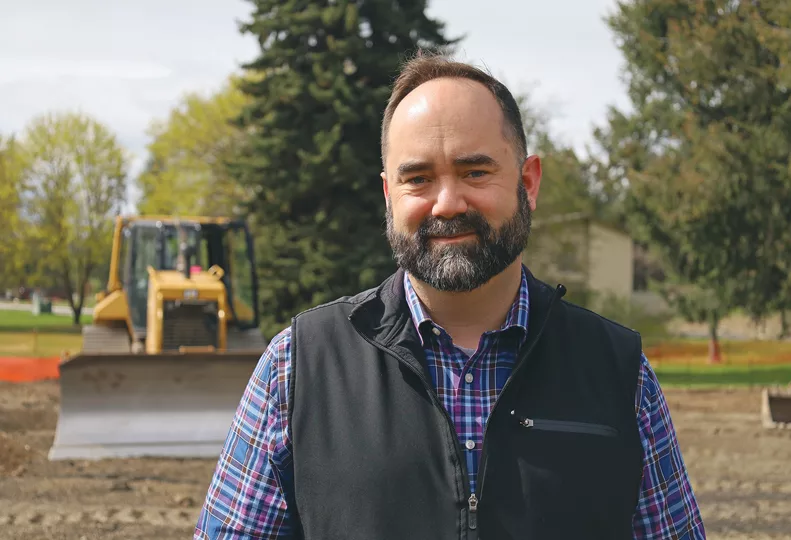
Excelsior proposes comprehensive wellness village at Indian Trail campus
Project to be phased over 10 years, with total value of up to $120 million

Excelsior Wellness plans a campus expansion in northwest Spokane to provide housing, public access, and commercial retail use over the next decade, says CEO Andrew Hill.
| Erica BullockFinishing touches are underway for the summer opening of Excelsior Wellness' revamped $8 million health clinic. The project is serving as a precursor of sorts to a new wave of development activity for an envisioned wellness campus at the 32-acre property in northwest Spokane's Indian Trail neighborhood.
About 25 acres of undeveloped land is available for future development and preservation at the property, where the nonprofit is planning the Excelsior Wellness Village, says CEO Andrew Hill.
The wellness village will be constructed in phases over 10 years for an estimated cost between $100 million to $120 million. The goal for the envisioned campus is to reinforce a commitment to well-being for neighborhood residents at all stages of life, says Hill.
"Our approach is that the neighborhood should act as a safety net. It should have a place of resources to support what people need," he says.
The comprehensive-plan amendment for Excelsior Wellness Village was submitted to the city of Spokane in October. Since then, the plan has been sent to a committee for review, and in March, the Spokane City Council was presented with a resolution to change the land use at the property to accommodate the future use.
Currently, the plan amendment is within a 30-day agency comment period to be followed by 60 days of public comment. Next on the project timeline, a plan commission hearing, followed by a City Council hearing, will be scheduled before the comprehensive plan lands on the mayor's desk for approval.
Excelsior currently operates a primary care clinic for people of all ages and a wellness center for young people from birth to 21 years old at the Indian Trail property. The nonprofit also operates a skilled nursing facility on its campus that can provide hospice care, memory care, and high-intensity psychiatric or behavioral health services for youth and young adults, ages 11 to 21.
Outside of the campus, Excelsior has a presence at some schools and in some professional buildings on the North Side. .
To complement the current health care programs, the organization plans to open the campus for public access, add more housing, and provide space for a commercial retail district, Hill explains.
"Everything starts here with the land," says Hill.
As envisioned, Excelsior Wellness Village will bring interconnected services to serve three nearby communities: Balboa-South Indian Trail, North Indian Trail, and Five Mile Prairie neighborhoods, he says.
Also, the site will include an Indigenous heritage site, interpretive trail, and preservation area, along with an expanded arboretum, walking trails, and healing gardens. Recreation and leisure activities, including a pool, gym, game fields, and a challenge course, are also planned, in addition to an early learning center and senior, multigenerational, and foster care housing.
The campus will continue to support wellness services, health care, and behavioral health, Hill says.
"Our first neighborhood presentation went really well and was really energizing. They were clapping at the end and thanking us and had no idea something like this is being thought about in the neighborhood," Hill says. "At this point, it is too early to determine what level of senior and workforce housing the neighborhood needs until we engage further with them about the vision."
 Image provided by Excelsior Wellness.
Image provided by Excelsior Wellness.The 32-acre Excelsior Wellness campus will be developed to include housing in the northern portion of land, a retail district along Indian Trail Road, and open space recreational use on the wooded hillside behind the health clinic.
"This land has been used by First People for centuries," says Hill.
In partnership with the Spokane Tribe of Indians, an Indigenous heritage site on a portion of the undeveloped land will be created with a series of walking trails and signage to identify notable historic features, which include historic pictographs, he says.
"Just north of here, Painted Rock State Park (has) pictographs there that resemble these," says Hill. "We're creating an agreement to preserve and protect (the heritage site) and let the tribe decide what is the value here."
The Indigenous heritage site will be located within Excelsior's expanded arboretum, which lies along a wooded hillside behind the main health clinic.
A facility for senior housing, assisted living, and memory care is planned in the middle of the property, southwest of the 50,000-square-foot, 32-unit skilled nursing building.
The residential campus plans include traditional, single-family homes that will give housing opportunities to people willing to foster children from adjacent neighborhoods, along with a microtransitional housing community for seniors and young adults.
"This will be housing for elders who are still independent and want to stay and be a part of this neighborhood but can't live independently and for young adults who don't have financial resources but need to establish independence separate from their families or caregivers," Hill explains.
Elders tend to leave their neighborhoods for higher levels of long-term care but end up losing their community connections and support, he says. By providing housing options, Excelsior Wellness Village will be a place for seniors to remain in the community and give back in their later years.
A walking district also will be incorporated into the village plans, to be comprised of local retailers and community gathering and event spaces.
"We want to build a small walking district so we can bring in minority, women, and veteran-owned local businesses," says Hill. "That will help support these resources."
The retail district would be a good fit for a bicycle rental company, fitness providers, cafes, crafts, or bookstores, and Hill says that the community is buying into the envisioned plan.
The plan is part of a pronounced shift for Excelsior, which has transitioned from being a residential facility for youth with a high level of needs to providing more outpatient care that serves about 5,000 families in the community, he says.
European homesteaders developed the property and later transferred it to the Sisters of Good Shepherd, who left the land in its natural state for nearly six decades, explains Hill.
The Sisters of the Good Shepherd built a building in the Lidgerwood area, on a site currently occupied by North Town Mall. Then, as a growing population encroached on the site, a second Spokane-area facility was constructed on Indian Trail Road in 1959. Excelsior transitioned to take over operations from 1978 to 1982 from the Sisters, Hill says.
"It's been 115 years since the Sisters started the work," he says. "They built their first home as a response to the orphan trains—a time when we put hundreds of thousands of kids on trains and sent them west during the Industrial Revolution. (The trains) were an opportunity to save kids lives and give them opportunities out of the inner city ... where they were subject to a lot of injury and trauma."
He adds, "It's an important part of the history of what's happened in Spokane to care for kids."
Today, the property still provides a place for youth in Spokane to receive care, says Hill.
Construction of the nonprofit's health clinic expansion has been underway since late 2022.
Trauma-informed design is now a priority for patients and includes elements such as separated receiving rooms and exit areas. A variety of rooms and open spaces are available for patients and families to wait for and receive care including traditional rooms, family areas, and a sensory room.
People with immediate needs such as a need for food, hygiene, or a space to decompress also will find support at the clinic.
Six exam rooms, a procedure room, observation rooms, and a lab are available for the clinic's five providers who are transferring from the Northpointe Medical Center, at 9631 N. Nevada, to work at the Indian Trail clinic.
"I'm pumped to see this complete, and the grand opening for this will be late summer."



_web.webp?t=1764835652)
